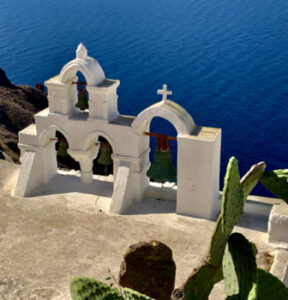 Harriet wasn’t really clumsy, No, not at all. She had, after all, a reputation as a good tennis player so that must have counted for something. But she had gestured at dinner and tipped over wine glasses or, once, she turned too quickly in a store and her backpack swept the shelf behind her clean. It was only toilet paper but it could have been glass figurines. Of course, in light of what she did later, these were minor incidents, just rehearsals to the grand finale which could have landed her in jail. Had we known what was coming, the toilet paper storm and water-in-the-lap incidents would have all been laughable. Harriet, I would say, was more unaware than anything else, just not cognizant of her spatial area when she was really into something, really concentrating. She laughed and joked and the others in the group enjoyed her company, as did I, but we all tended to move stuff out of her way when she was near us. We would hold our wine glasses or take a step or two back when she approached, knowing that at any moment we could lose a glass of good pinot noir or get a fingernail in the eye.
Harriet wasn’t really clumsy, No, not at all. She had, after all, a reputation as a good tennis player so that must have counted for something. But she had gestured at dinner and tipped over wine glasses or, once, she turned too quickly in a store and her backpack swept the shelf behind her clean. It was only toilet paper but it could have been glass figurines. Of course, in light of what she did later, these were minor incidents, just rehearsals to the grand finale which could have landed her in jail. Had we known what was coming, the toilet paper storm and water-in-the-lap incidents would have all been laughable. Harriet, I would say, was more unaware than anything else, just not cognizant of her spatial area when she was really into something, really concentrating. She laughed and joked and the others in the group enjoyed her company, as did I, but we all tended to move stuff out of her way when she was near us. We would hold our wine glasses or take a step or two back when she approached, knowing that at any moment we could lose a glass of good pinot noir or get a fingernail in the eye.
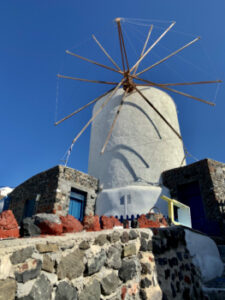 As good as she was at her job, an accountant for a large firm in Chicago, her college degree had apparently left her lacking in any humanities or history. She knew who Kim Kardashian was and Beyoncé and Lady Gaga were two of her favorite cultural icons. Even going, as she said, way back into history, she knew of Tommy Dorsey and had heard of Picasso. She had a vague idea that the American Civil War was sometime in the 19th century and that there had been a revolution in France ‘like a hundred years ago’ because she had seen Les Miserables. Normandy had something to do with WWII and Europe but the fact that it was in France or that the battle took place in 1944 seemed beyond her. Hitler? Oh yes, she knew of Hitler and even Stalin although she wasn’t exactly sure who this was and pronounced his name without the ‘l’. Perhaps ‘Stain’ was a more appropriate name for him anyway. However, she knew all about Queen Elizabeth II and could recite every recent scandal that had befallen the royals. Homer, the Iliad, the Odyssey? Socrates? The birth of democracy? Nope, not a clue. Yet here we were in Greece.
As good as she was at her job, an accountant for a large firm in Chicago, her college degree had apparently left her lacking in any humanities or history. She knew who Kim Kardashian was and Beyoncé and Lady Gaga were two of her favorite cultural icons. Even going, as she said, way back into history, she knew of Tommy Dorsey and had heard of Picasso. She had a vague idea that the American Civil War was sometime in the 19th century and that there had been a revolution in France ‘like a hundred years ago’ because she had seen Les Miserables. Normandy had something to do with WWII and Europe but the fact that it was in France or that the battle took place in 1944 seemed beyond her. Hitler? Oh yes, she knew of Hitler and even Stalin although she wasn’t exactly sure who this was and pronounced his name without the ‘l’. Perhaps ‘Stain’ was a more appropriate name for him anyway. However, she knew all about Queen Elizabeth II and could recite every recent scandal that had befallen the royals. Homer, the Iliad, the Odyssey? Socrates? The birth of democracy? Nope, not a clue. Yet here we were in Greece.
 Why she had joined the Greece tour was a bit baffling until she explained that she was sick of the gray cloudy weather at home, the cool temps and had grown tired of staring at numbers. No mention of history or culture. She wanted to get away, to go where there was sun and some excitement. Sun came with the territory. The excitement Harriet herself provided later.
Why she had joined the Greece tour was a bit baffling until she explained that she was sick of the gray cloudy weather at home, the cool temps and had grown tired of staring at numbers. No mention of history or culture. She wanted to get away, to go where there was sun and some excitement. Sun came with the territory. The excitement Harriet herself provided later.
‘So I told him ‘no’, I’m not paying $480 for some knock off Gucci shoes, thank you’. Harriet was jabbering to Barbara in the lobby of our Athens hotel. ‘The real ones are only $100 bucks more!’ Harriet had told us about the Gucci shoes, Prada scarves and her stay at the Waldorf Astoria as we walked Athens. Now on the streets of Fira, largest town on the island of Santorini, she was going on about a Louis Vuitton something or other. ‘Look at the name, will you, I told the clerk. Just look at it. The real Vuitton has two ‘t’s and this piece has only one ‘t’ embossed on it. This is a fake for sure!’ About high fashion there was no end to her stream of consciousness babble. ‘And you know what she said, this clerk…….oh…..are we here? Is this the museum?’ We stood at the entrance to the City of Fira Prehistory Museum of Santorini. ‘More old stuff,’ she mumbled.
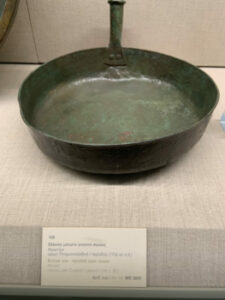 To give her credit, she had asked why the Parthenon in Athens was missing a roof and a wall and thought the lighted Acropolis a beautiful sight when we viewed it at night from the rooftop bar of our hotel. Seemingly unmoved otherwise, Harriet snapped one photo, turned to the barman and ordered a gin and tonic. Several days before we had visited the Acropolis Museum, one of the three finest archaeological museums in the world. Harriet had marched up to the information counter and asked, ‘Can you please tell me where to find the gift shop? Oh yes, and where is the cafe? Do they serve wine?” At least she had said ‘please’. I thought that a nice touch. Plus she drank well with others and was always cheerful.
To give her credit, she had asked why the Parthenon in Athens was missing a roof and a wall and thought the lighted Acropolis a beautiful sight when we viewed it at night from the rooftop bar of our hotel. Seemingly unmoved otherwise, Harriet snapped one photo, turned to the barman and ordered a gin and tonic. Several days before we had visited the Acropolis Museum, one of the three finest archaeological museums in the world. Harriet had marched up to the information counter and asked, ‘Can you please tell me where to find the gift shop? Oh yes, and where is the cafe? Do they serve wine?” At least she had said ‘please’. I thought that a nice touch. Plus she drank well with others and was always cheerful.
‘What is this? A frying pan?,’ she asked, looking through the glass at a large bronze piece with a flat bottom, rounded sides and a long handle. We had entered the Fira Pre History Museum on Santorini. The small sign read ‘Brass skillet used to fry and make flat bread. 1700 BC’, but Harriet moved along too quickly to read. ‘Are those toys? Like, kids’ toys? Really? Kids played with toys back then?’ She was glancing at small terra cotta figures and miniature dolls, identified as ‘Toys’. Harriet seemed almost curious. ‘This one looks like an alien.’ The figurine she saw was perhaps a foot tall, the surface worn smooth by the elements and time. It was a simple statue, female, and above her face was an extension that appeared to be an elongated head, as if her forehead extended upward for an inch or two, making the shape appear like a Steven Spielberg Hollywood alien, or a Saturday Night Live Conehead. The plaque explained this was a local goddess with a headpiece or crown.
 I saw Harriet step into the next room and when I walked in, she had stopped at the center display, a large jug on a plinth. She was looking down, and seemed to be admiring the foot of the vase, as if she was trying to figure out something. Then I heard, ‘Are those Botticelli shoes?’ She was talking to a woman standing a few feet from the large piece of terra cotta. ‘Wow, I love’em! They’re amazing.’
I saw Harriet step into the next room and when I walked in, she had stopped at the center display, a large jug on a plinth. She was looking down, and seemed to be admiring the foot of the vase, as if she was trying to figure out something. Then I heard, ‘Are those Botticelli shoes?’ She was talking to a woman standing a few feet from the large piece of terra cotta. ‘Wow, I love’em! They’re amazing.’
Harriet moved between the artwork and the Shoe Lady, backed up a bit to focus her camera, and knelt to take a photo. Oblivious as usual to what was behind her, Harriet stuck out her bum. Contact! The large vase in back of her began to sway. The Botticelli Shoe Lady clapped her hand to her mouth and pointed, wide eyed, as the 5 foot tall piece of 4000 year old clay rocked from side to side. Botticelli Shoes, staring in horror, shrieked and began to collapse. I caught her a moment before she hit the floor.
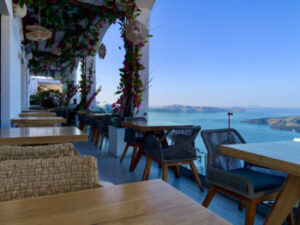 Harriet spun around to see what was happening and smacked the teetering piece of terra cotta with her hand. It swayed even more, then, like a ball, rolled onto its side. It rocked back and forth a couple of times and it began to spin, first the delicate floral pattern of green bamboo sprigs, then rose colored blossoms, green sprigs, blossoms, sprigs, blossoms, so fast, the designs blurred into one. Harriet lost her balance, fell over in a heap, righted herself, and scrambled on all fours after the whirling crock. I had my hands full with Botticelli Shoes, now in a full faint, and could only watch in alarm as Harriet’s drama spun out in front of me. Harriet tried but wasn’t able to grip any of the gyrating handles. The giant jug swiveled a couple of times, and headed toward the stairs, now propelled by her efforts to grab it. I saw the panic on her face, the ‘this isn’t happening, this can’t happen, this won’t happen’, look of terror.
Harriet spun around to see what was happening and smacked the teetering piece of terra cotta with her hand. It swayed even more, then, like a ball, rolled onto its side. It rocked back and forth a couple of times and it began to spin, first the delicate floral pattern of green bamboo sprigs, then rose colored blossoms, green sprigs, blossoms, sprigs, blossoms, so fast, the designs blurred into one. Harriet lost her balance, fell over in a heap, righted herself, and scrambled on all fours after the whirling crock. I had my hands full with Botticelli Shoes, now in a full faint, and could only watch in alarm as Harriet’s drama spun out in front of me. Harriet tried but wasn’t able to grip any of the gyrating handles. The giant jug swiveled a couple of times, and headed toward the stairs, now propelled by her efforts to grab it. I saw the panic on her face, the ‘this isn’t happening, this can’t happen, this won’t happen’, look of terror.
Harriet had no time to stand up and give chase as the ancient piece of terra cotta traversed the tile floor, gathering velocity as it went, speeding toward the stairwell. Desperate, Harriet crawled on her knees, threw her phone aside and grabbed at the rumbling, rotating jar. The staff, alerted by the shrieks, raced toward Harriet and the escaping vase, getting ever closer to the top of the steps and the darkness beyond. The jug appeared alive, lured toward the deep stairwell, running from Harriet, tasting freedom it didn’t want to give up.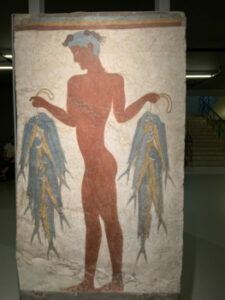
The first docent on the scene was too far away to stop the speeding vase, and a guard, who had just rounded the corner, stood stock still, frozen as the priceless piece of 4000 year old pottery neared its destruction. The journey down the stairs would shatter the brittle thing into tiny shards, never to be put back together again, neither by an archeologist nor all the kings men.
In one last desparate act, Harriet swung herself around, ripping her skirt, and flung herself onto the second step. She put up her hands as the heavy jug reached the stair edge and teetered, its mass propelled by motion and drawn by gravity. Harriet fought the jug’s weight, struggling to get both hands on it. Finally, putting her shoulder into it, she managed to roll it off the edge, back from destruction, and onto the safety of the broad, blood-smeared tile floor. She held on, heaving for breath, sweating with the effort and the strain of fear.
Alarms blaring, staff ran out of back rooms. Docents, guards, the gift shop personnel, all gathered to the site of the near disaster. They gaped in shock at what had almost happened, realizing that a priceless antique had just barely been saved. Then they were grabbing at the vase and at Harriet, all shouting at once. Harriet, scraped, bloodied and bruised, was near tears, choked with emotion and shame. The staff saw only that she had saved the piece at the last second and sacrificed her body to do it. She appeared before them not as a guilty party, but as the savior of an antiquity.
The jug was secured, while two guards helped Harriet stand. Others pointed to her knees and hands, both bleeding freely, and ran off for cloths, bandages and ice. They handed her a bottle of water and a chair appeared. Harriet slumped into it. Botticelli Lady had come around and a staff member led her away, but not before she pointed and jabbered at Harriet in a language no one seemed to understand.
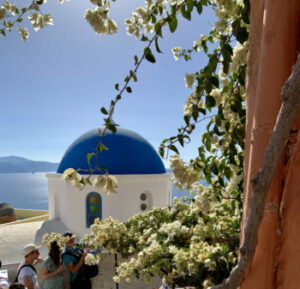 Harriet caught her breath, heaved a couple of times and began to apologize. She cried out over and over that it was an accident, that she only wanted a photo of the Botticelli shoes, that she hadn’t intentionally knocked the thing over. But no one heard her. They were all too busy praising her effort, breathing sighs of relief, and smiling their thanks for saving the piece. It became apparent, even to Harriet, that they did not know she had been the one who knocked over the vase in the first place. She tried. ‘I knocked it over, It was me. I’m so sorry!” But to no avail. Too little English, too much confusion and background noise. They weren’t interested in how it had toppled over, only that she had saved it. They hugged her, praised her in Greek, and would have shaken her hand except it was so covered with blood. She glanced over at me and I put my finger to my lips. She shut up and just smiled.
Harriet caught her breath, heaved a couple of times and began to apologize. She cried out over and over that it was an accident, that she only wanted a photo of the Botticelli shoes, that she hadn’t intentionally knocked the thing over. But no one heard her. They were all too busy praising her effort, breathing sighs of relief, and smiling their thanks for saving the piece. It became apparent, even to Harriet, that they did not know she had been the one who knocked over the vase in the first place. She tried. ‘I knocked it over, It was me. I’m so sorry!” But to no avail. Too little English, too much confusion and background noise. They weren’t interested in how it had toppled over, only that she had saved it. They hugged her, praised her in Greek, and would have shaken her hand except it was so covered with blood. She glanced over at me and I put my finger to my lips. She shut up and just smiled.
Now you would think that would be the end of it. That all of the attention, the cleaning up of the knees, the safety pins in the torn skirt, the bandages on the hands would have ended it and that Harriet would only want a strong gin and tonic and a bed. But that’s not what happened. Maybe it was the reality of making contact with that gorgeous piece of history. Maybe it was the act of saving an antiquity which some would consider as important as saving a life. Certainly saving history. I never figured it out but something snapped in Harriet.
‘I touched it,’ she whispered to me as I wrapped the bandages on her left hand, still oozing blood. It must have been painful but she never winced nor complained. ‘I touched it. It’s real. It’s real and I touched a piece of history, a 5000 year old gorgeous urn.’ It was 4000 years old but age wasn’t the issue. ‘Did you see the design on it, the leaf pattern, the delicate petals. And the size of it. How could they have made something so big, so beautiful? And why?!’, she said, ‘why did they make it?’
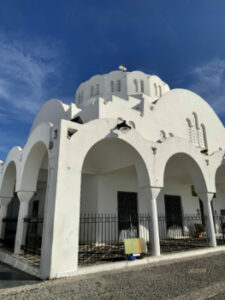 The urn had been righted and placed on its plinth, undamaged. Its chunky rollypolly shape had kept it unharmed. To protect the piece from further bums, the docents surrounded it with four stainless steel posts, velvet cords strung between.
The urn had been righted and placed on its plinth, undamaged. Its chunky rollypolly shape had kept it unharmed. To protect the piece from further bums, the docents surrounded it with four stainless steel posts, velvet cords strung between.
Still shaky, Harriet decided she would stay in the museum a bit longer. Besides, ‘I want to ask the docents some questions.’ Later, she regaled us with what she discovered. ‘The population, the people, the whole place was run by women!! WOMEN! Can you imagine that! 4000 years ago. They traded pottery and some special sand to make a living and had peace for 2000 years. The Minoans, that’s what they were called, I think, they had schools and shops and a port and they made their living by trading with other places around the Mediterranean.’ Harriet was too worked up at dinner to eat. ‘No wars! Isn’t that amazing. They had shuttle boats between the islands and had running water and toilets. And the pottery! Wow, the pottery! It was everything to them, it was their culture, their art, they kept food fresh and safe and, well, ya know, it was kind of like early Tupperware.’ The others chuckled at this, but Harriet was caught up in the moment and went on about the museum.
‘Did you see those frescos?!?! Oh my god, how amazing are those. Such deep reds and blues and all the people in them, real people. People who lived and breathed and worked and loved 4000 years ago. The figures! They look just like us, they could be us, they look so modern, so alive.’ Everyone had seen the frescos but no one could describe them with such exuberance, such excitement as Harriet. She was a born again historian.
‘What happened to it? Where did it all go?’, someone asked. In the confusion and chaos of the jug episode, there had been little chance to explain much of the history. Harriet was now the recognized authority on the Minoan civilization. ‘Oh, well, you won’t believe it,’ Harriet said. ‘Like, right after all of that stuff was made, even the vase that I….that nearly rolled down the stairs and smashed, there was a huge volcanic explosion and it wrecked everything. Most of this island disappeared under the sea. We’re like on the lip of the left over volcano crater. Marina,’ Harriet referred again to her docent, ‘explained all that. I don’t know where the people went but the whole thing ended right then. BANG! End of the Minoans. Pretty sad, huh.’
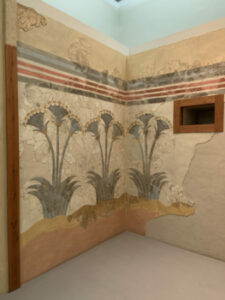 The others were spellbound. Harriet’s excitement was contagious, tactile, real. Somehow and in some new place, Harriet had arrived. ‘So’, she turned to me. ‘What do we do tomorrow?’
The others were spellbound. Harriet’s excitement was contagious, tactile, real. Somehow and in some new place, Harriet had arrived. ‘So’, she turned to me. ‘What do we do tomorrow?’
Tomorrow would be the 4500 year old site of the town of Akrotiri. I thought about countless ancient vases, urns and cups. If she saw a Prada scarf or Gucci handbag, what mayhem could she cause? No, Akrotiri, subterranean ruins protected by a guard rail, should be Harriet-safe.
‘Akrotiri’, I said. We’ll take the 10am bus.’ ‘Awesome! I’ll drink to that!’ She raised her hand to summon the bartender. ‘Another gin and tonic please. A double!’ She’d even pronounced Akrotiri correctly.
